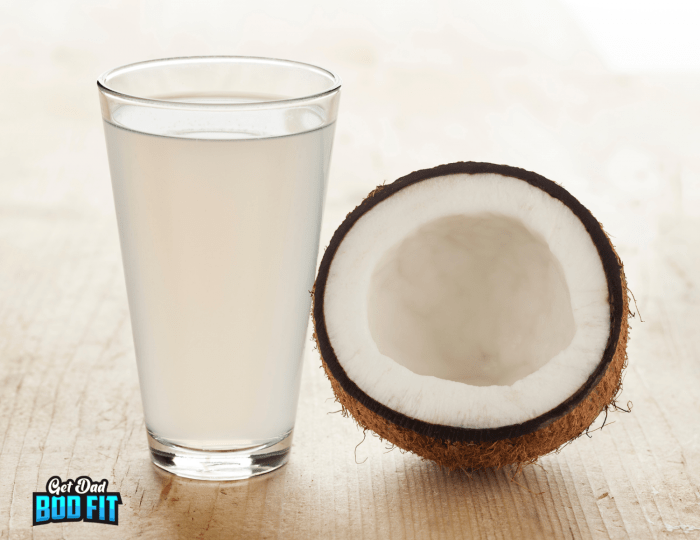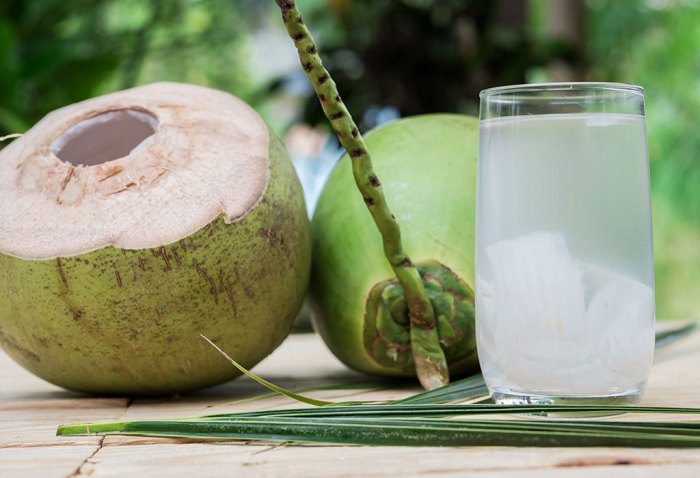How Much Coconut Water Per Gallon for Plants?
Coconut Water as Plant Fertilizer: A Comprehensive Guide

Source: wixstatic.com
How much coconut water per gallon for plants – Coconut water, a natural byproduct of coconut production, offers a surprisingly effective and eco-friendly alternative to conventional plant fertilizers. Its rich nutrient profile provides essential elements for plant growth, making it a valuable resource for both home gardeners and agricultural settings. This guide explores the optimal utilization of coconut water for plant nourishment, covering various aspects from concentration and application to potential risks and comparisons with other fertilizers.
Coconut Water Concentration for Plant Watering
The concentration of coconut water used for plant watering significantly impacts its effectiveness. Using undiluted coconut water can lead to salt buildup in the soil, harming plant roots. Diluting the coconut water with plain water is crucial for optimal results. Different plants respond differently to varying concentrations; experimentation is key to finding the ideal ratio for each plant species.
| Coconut Water Ratio | Plant Type | Growth Rate (relative) | Observations |
|---|---|---|---|
| 25% | Orchids | Moderate | Improved flowering, healthier leaves. |
| 50% | Tomatoes | Good | Increased fruit production, vigorous growth. |
| 75% | Leafy Greens | Fair | Slightly improved growth, but some leaf burn observed. |
| 100% | Most Plants | Poor | Salt buildup, stunted growth, root damage. |
Plants like orchids and bromeliads generally tolerate diluted coconut water well, while sensitive plants such as succulents may experience negative effects from even low concentrations. Experimentation with different dilutions is essential to determine the optimal ratio for each plant species.
Nutrient Content and Plant Needs

Source: getdadbodfit.com
Coconut water contains a blend of macronutrients (potassium, phosphorus, nitrogen) and micronutrients (iron, manganese, zinc) vital for plant health. Potassium aids in disease resistance and overall plant strength, while phosphorus is crucial for root development and flowering. Nitrogen promotes leafy growth. Micronutrients contribute to various enzymatic processes within the plant.
Compared to chemical fertilizers, coconut water offers a more balanced nutrient profile, minimizing the risk of nutrient imbalances. However, it’s less concentrated, requiring more frequent applications. A potential deficiency might occur if coconut water is the sole nutrient source, especially for plants with high nutrient demands.
Application Methods and Frequency, How much coconut water per gallon for plants
Coconut water can be applied through various methods, each with its advantages and disadvantages. Foliar sprays deliver nutrients directly to leaves, while soil drenches provide nourishment to the roots. Watering cans offer a simple and versatile application method.
| Application Method | Advantages | Disadvantages | Suitable Plant Types |
|---|---|---|---|
| Foliar Spray | Quick nutrient uptake, effective for micronutrient delivery. | Can be less effective for macronutrients, requires frequent application. | Orchids, ferns, leafy greens |
| Soil Drench | Provides nutrients to the root system, suitable for macronutrients. | Slower nutrient uptake, potential for overwatering. | Most plants |
| Watering Can | Simple, versatile, suitable for both soil and foliar application. | May not provide even distribution of nutrients. | Most plants |
Application frequency depends on plant type, growth stage, and environmental conditions. Young plants may require more frequent applications than mature plants. Regular monitoring of plant health is crucial to adjust application frequency as needed.
Potential Risks and Considerations
While generally safe, using coconut water as a fertilizer carries some potential risks. Improperly diluted coconut water can lead to salt buildup, harming plant roots. Excessive moisture can encourage fungal growth and attract pests. Proper preparation and application are essential to mitigate these risks.
To avoid problems, always dilute coconut water appropriately. Ensure good drainage to prevent waterlogging. Regularly inspect plants for signs of disease or pest infestation. Store unused coconut water in a cool, dark place to prevent spoilage.
- Always dilute coconut water before application.
- Ensure proper drainage to avoid waterlogging.
- Monitor plants for signs of disease or pests.
- Store unused coconut water properly.
Alternatives and Comparisons to Other Fertilizers
Coconut water offers a sustainable alternative to synthetic fertilizers, reducing reliance on chemical inputs. Compared to other organic fertilizers like compost tea, coconut water provides a more readily available source of nutrients. However, its nutrient concentration is lower, requiring more frequent applications compared to some commercial fertilizers.
Coconut water is a suitable fertilizer for various plants, particularly those sensitive to high salt concentrations. However, for plants with high nutrient demands, supplementing with other fertilizers may be necessary. The environmental impact of using coconut water is significantly lower than synthetic fertilizers, reducing water pollution and soil degradation.
Visual Representation of Coconut Water’s Effect on Plants

Source: cdnparenting.com
Plants watered with diluted coconut water often exhibit improved leaf color, appearing greener and more vibrant compared to plants watered with plain water. Leaves may be larger and more robust, showcasing improved overall plant health. The growth patterns are typically more vigorous, with faster stem elongation and increased branching. A control group using plain water might show slower growth, smaller leaves, and a less vibrant green color.
The visual differences become more pronounced over time, demonstrating the positive impact of coconut water on plant health and growth.
For example, a tomato plant watered with a 50% coconut water solution might show significantly larger and more numerous fruits compared to a control plant. Similarly, an orchid watered with a 25% solution might exhibit more abundant and longer-lasting blooms. These visual cues provide clear evidence of coconut water’s beneficial effects on plant development.
FAQ Resource: How Much Coconut Water Per Gallon For Plants
Can I use coconut water directly from the carton on my plants?
It’s generally recommended to dilute coconut water before applying it to plants to avoid potential nutrient imbalances or salt buildup. A 25% dilution is a good starting point.
How often should I water my plants with diluted coconut water?
Frequency depends on the plant type and its water needs. Start with a weekly application and adjust based on your observations. Overwatering can be detrimental.
What if my plants show signs of wilting or discoloration after using coconut water?
Reduce the concentration or frequency of application. The problem might be due to over-fertilization or an unsuitable dilution. Observe your plants closely and adjust accordingly.
Does coconut water attract pests?
While not inherently pest-attracting, leaving excess coconut water on the leaves can create a moist environment conducive to pest growth. Ensure proper drainage and avoid over-application.





















